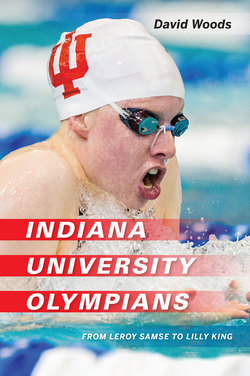Читать книгу Indiana University Olympians - David Woods - Страница 6
На сайте Литреса книга снята с продажи.
ОглавлениеPREFACE
INDIANA UNIVERSITY HAS LONG BEEN KNOWN FOR BASKETBALL, AS it should be. Only UCLA (eleven), Kentucky (eight), and North Carolina (six) have won more NCAA championships than the Hoosiers’ five.
But Indiana’s legacy at the Olympic Games is no less impressive. The Hoosiers have collected fifty-five gold medals for the United States since the modern Olympics debuted in 1896, a figure exceeded by just seven schools: Stanford, UCLA, the University of Southern California, Texas, Michigan, and Florida. Indiana’s ninetyfive total medals rank eleventh.
This book has profiles of forty-nine IU Olympians. In the following pages, you will read that:
· The greatest athlete in IU history was not actually recruited by IU.
· A long jump gold medalist had such humble beginnings that he grew up in a chicken house.
· The Hoosiers produced the first African American gold medalist in the decathlon.
· A diver who had never before competed on the 10-meter platform won a gold medal a few months after she first tried it.
· The soccer player who helped build the Hoosiers’ dynasty was discovered on Chicago playgrounds.
· A swimmer later became head valet for a Saudi Arabian prince and then a master chef.
· A swimmer was part of rescue missions for astronauts who walked on the moon.
· A double gold medalist won a Silver Star for heroism in the Vietnam War.
· Two distance runners became FBI agents.
Those athletes, in order, are Mark Spitz, Greg Bell, Milt Campbell, Lesley Bush, Angelo DiBernardo, Mike Stamm, Fred Schmidt, Mike Troy, Don Lash, and Fred Wilt.
The event in which the Hoosiers have the most gold medals (ten) is swimming’s 4×100-meter medley relay: Frank McKinney, 1960; Kathy Ellis and Fred Schmidt, 1964; Charlie Hickcox and Don McKenzie, 1968; Mark Spitz and Mark Stamm, 1972; Mark Kerry (Australia), 1980; Lilly King and Cody Miller, 2016. Through 2016, the US men had never lost the 4×100 medley relay at an Olympics.
The Hoosiers also have four gold medalists in track and field’s 4×400-meter relay: Ivan Fuqua, 1936; Roy Cochran, 1948; Sunder Nix, 1984; and David Neville, 2008.
The Hoosiers have earned a medal in every Olympics in which they competed, except 2004. In 1968, Indiana came away with seventeen medals, a total exceeded by only eight countries.
Indiana features 223 total Olympic berths, including athletes, coaches, and judges. Those are led by one hundred in men’s swimming and diving, thirty-nine in men’s track and field, and thirty in women’s swimming and diving.
The twenty-four nations or territories besides the United States that a Hoosier has represented include Australia, Austria, Brazil, Canada, Colombia, Denmark, Dominican Republic, Egypt, France, Germany, Greece, Honduras, Hong Kong, Hungary, Ireland, Jamaica, Mexico, Nigeria, Puerto Rico, Saudi Arabia, Slovenia, Spain, Ukraine, and Venezuela.
This book is devoted to athletes, but Indiana has had multiple coaches on US staffs. Those include Bob Knight and Tara VanDerveer in basketball; Billy Hayes and Sam Bell in track and field; Doc Counsilman and Ray Looze in swimming; Hobie Billingsley, Jeff Huber, and Drew Johansen in diving; and Billy Thom and Jim Humphrey in wrestling.
The Hoosiers inevitably will send more athletes to Tokyo for the next Olympic Games, which were postponed from 2020 to 2021 by a pandemic. They will bring more medals back to Bloomington and build on a tradition that few universities can emulate.
